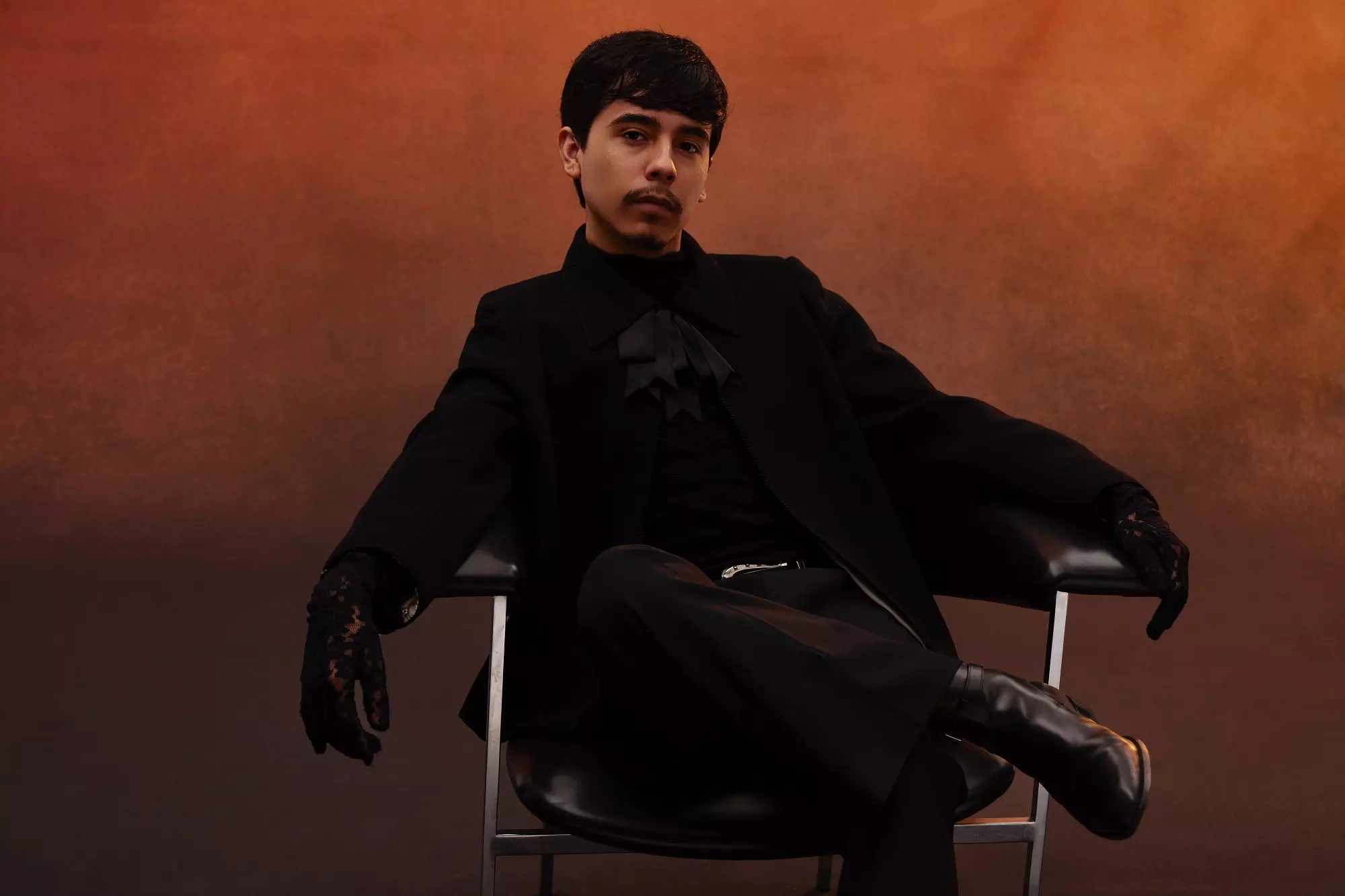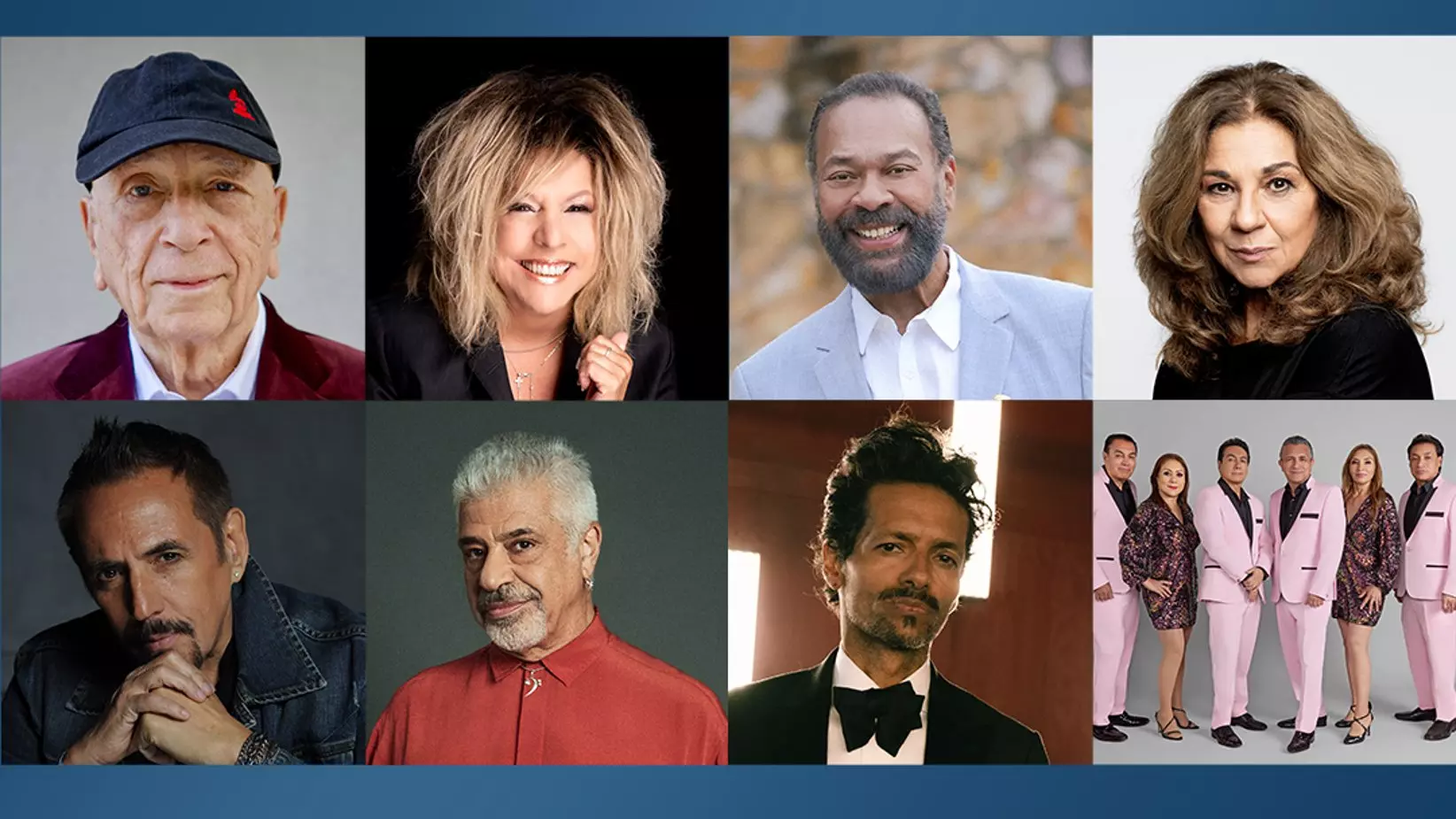Photo: Neilson Barnard/Getty Images for Latin Recording Academy

news
2023 Latin GRAMMYs Red Carpet Fashion: See Pics Of Rosalía, Karol G, Peso Pluma, Shakira, Bizarrap, & More
For the 24th Latin GRAMMYs Awards, Latin music's biggest artists graced Sevilla, Spain’s royal red carpet in their most dazzling outfits.
The 2023 Latin GRAMMYs are not just The Biggest Night In Latin Music — it was also an occasion for the leading lights in Latin music to don a plethora of eye-catching outfits. Just as many of the nominated artists blend genres and break barriers, so too did their sartorial choices.
Latin GRAMMY performers and nominees demonstrated their individuality and creativity with extravagant, playful styles. Artists including Rosalía, Karol G, Bizarrap, Peso Pluma, Juanes, and Sebastián Yatra donned jaw-dropping award show looks. Daniela Santiago, Liz Trujillo and Sandra Calixto of Música Mexicana group Conexión Divina coordinated their all black and leather ensembles, while singer/songwriter Natalia Lafourcade — who took home multiple Latin GRAMMYs for, including Record Of The Year, for "De Todas Las Flores" — added a satin green touch to the red carpet.
The most-nominated artists at the 2023 Latin GRAMMYs are Camilo, Karol G and Shakira, each of whom have seven nominations. Songwriter and composer Keityn also received seven nominations. Edgar Barrera, who took home the Latin GRAMMY Award for Producer Of The Year, led the night with 13 nominations.
Hosted by Latin GRAMMY winner and performer Sebsatián Yatra, GRAMMY nominee and actress Danna Paola, along with critically-acclaimed actresses Roselyn Sánchez and Paz Vega — who each also made fashion statements — the 2023 Latin GRAMMYs were an aural and visual night to remember.
Here are some of our favorite looks from the red carpet at the FIBES Conference and Exhibition Centre in Sevilla, Spain.
Karol G ┃John Parra/Getty Images for Latin Recording Academy
Rosalía | Patricia J. Garcinuno/WireImage
Bizarrap | Juan Naharro Gimenez/Getty Images
Natalia Lafourcade ┃Juan Naharro Gimenez/Getty Images
Peso Pluma and Nicki Nicole┃Rodrigo Varela/Getty Images for Latin Recording Academy
Sebastian Yatra┃Patricia J. Garcinuno/WireImage
Conexión Divina┃Juan Naharro Gimenez/Getty Images
Karen Martinez and Juanes┃Neilson Barnard/Getty Images for Latin Recording Academy
Mon Laferte┃Rodrigo Varela/Getty Images for Latin Recording Academy
Edgar Barrera┃Neilson Barnard/Getty Images for Latin Recording Academy
Maria Becerra┃Rodrigo Varela/Getty Images for Latin Recording Academy
India Martínez┃Rodrigo Varela/Getty Images for Latin Recording Academy
Joaquina┃Rodrigo Varela/Getty Images for Latin Recording Academy
Kenia OS┃Neilson Barnard/Getty Images for Latin Recording Academy
Sita Abellán┃Patricia J. Garcinuno/WireImage
2023 Latin GRAMMYs: See The Complete Winners & Nominations List

Photo: Jaime Nogales
list
7 Artists Bringing Reggaeton Mexa To The World: El Malilla, Bellakath & More
Pulling from the genre's underground roots in Puerto Rico, these fast-rising reggaeton Mexa artists infuse their own culture and grit into a globally-appealing sound.
Música Mexicana isn't the only sound of Mexico that's blowing up; the country's artists are now starting to make their mark in reggaeton. Imbued with the essence, swagger, and lingo of Mexico, reggaeton Mexa is the next big Latin sound that's going global.
Originating in the Caribbean, reggaeton evolved from Panama’s reggae en español and Jamaican dancehall of the 1980s. Puerto Rican acts like DJ Playero and DJ Nelson shaped the sound of reggaeton in the island's underground scene during the '90s, while Daddy Yankee, Tego Calderón, Don Omar, and Ivy Queen pushed the genre into the mainstream at the dawn of the new millennium.
Boricua acts Tainy, Bad Bunny, and Ozuna pushed reggaeton into the next decade, though Colombia also brought about the genre's second wind. J Balvin's success solidified Medellín as a reggaeton hotbed, spawning Maluma, Karol G, and Feid as global stars.
Learn more: The Sonic And Cultural Evolution Of Reggaeton In 10 Songs
In the 2020s, Mexico is becoming the next hub for reggaeton as artists who grew up listening to the Puerto Rican OGs — as well as Mexican acts Ghetto Kids and Pablito Mix — are now putting their own stamp on the genre. In late 2022, Bellakath put a spotlight on reggaeton Mexa with her viral hit "Gatita"; the following year, Yng Lvcas took the sound to new heights with his "La Bebé" remix featuring Peso Pluma, which reached No. 11 on the Billboard Hot 100 chart.
Reggaeton Mexa pulls from the genre's underground roots in Puerto Rico, infusing its songs with Mexican culture and grit. Lyrics are full of Mexican slang that reflect life in the barrios.
"Reggaeton Mexa is reminiscent of the sounds of the '90s and 2000s from Puerto Rican DJs like Playero and Joe," El Mallila, one of the reggaeton Mexa leaders, tells GRAMMY.com. "The songs, the beats, and rhythms are more or less similar to that flow. The difference here is the Mexican jargon. Reggaeton Mexa is spicy. We play with Mexican profanities without being offensive."
The emerging genre has gained traction among the larger reggaeton community with Jowell y Randy, Maldy, and J Balvin recently featuring on their songs. Following the success of Yng Lvcas, Bellakath, and El Malilla, Mexican acts like Peso Pluma (who dedicated part of his Éxodo album to reggaeton) and pop star Kenia Os are embracing the wave. As the tide continues to rise for reggaeton Mexa, GRAMMY.com is highlighting seven of the sound's leading artists.
Yng Lvcas
Guadalajara, Jalisco native Yng Lvcas noted that no one around him could name a Mexican reggaeton artist, so he decided to fill that void.
An early encounter would make for auspicious beginnings. As he was signing a record contract with Warner early last year, Yng Lvcas crossed paths with Peso Pluma. The música Mexicana star's first foray in reggaeton was with Yng Lvcas and their global hit, a sensual remix of "La Bebé." Their collaboration became the first reggaeton song by Mexican artists to enter the Hot 100 chart.
Last October, Yng Lvcas released his album Super Estrellas to put a spotlight on more reggaeton Mexa acts. The LP included songs with El Malilla and El Bogueto. Puerto Rican OG Maldy later teamed up with Yng Lvcas for the hypnotic "Diviértete."
Bellakath
The first artist to get the global conversation started about reggaeton Mexa was Bellakath. After earning a law degree from the National Autonomous University of Mexico, the Mexico City native became a social media personality. Bellakath leveraged her following to start her music career, which exploded in late 2022 with the frisky "Gatita." The song went viral on TikTok and the music video has over 144 million views on YouTube.
In the male-dominated reggaeton Mexa scene, Bellakath is continuing to keep women on top. Last year, she released her debut album Kittyponeo with the hit "Reggaeton Champagne" featuring Dani Flow. After signing with Warner in May, Bellakath dropped "Sandunguea," which sampled the reggaeton classic "Mayor Que Yo" by Luny Tunes. On July 15, Bellakath released her second album, Sata 42, where she ventured into dembow music with artists from the Dominican Republic.
Learn more: 5 Women Essential To Reggaeton: Ivy Queen, Natti Natasha, Karol G, Ms Nina & Mariah Angeliq
El Malilla
El Malilla proudly represents the chakalones (Mexican slang for "bad boys") in reggaeton Mexa. Hailing from Valle de Chalco, El Malilla remembers his first encounter with reggaeton as a teen came from the pirated CDs that were sold at the tianguis, or open-air markets.
Now, El Malilla is bringing Mexico's version of reggaeton to the forefront. He recently released his debut album ÑEROSTARS, which includes his viral hit "B de Bellako" with Yeyo. Back in May, Puerto Rican OGs Jowell y Randy jumped on a remix of the quirky banger.
El Malilla also wants to make reggaeton Mexa more inclusive. Reggaeton has historically excluded LGBTQIA+ folks, though queer artists such as Young Miko, Villano Antillano, and La Cruz are changing that tune. On the Mexican front, El Malilla wanted to be an ally to his queer fans with the 2000-inspired "Rebote" music video, which was shot at the gay club Spartacus with Mexican drag queens.
Within his album, El Malilla is also stretching the bounds of his artistry by exploring merengue in "Coronada" and experimenting with house music in "Todo Tiene Su Final." "ÑEROSTARS is a call to all the reggaeton Mexa artists to dare themselves to make new music and try different sounds," he says. "Don’t stay in your comfort zone just making perreo."
Yeri Mua
Veracruz native Yeri Mua is keeping a high heel firmly planted on the neck of the genre, holding it down for the women in reggaeton Mexa.
Mua started out doing makeup tutorials on YouTube and later grew a massive social media following. Last year, she launched her music career on Uzielito Mix's reggaeton romp "Línea del Perreo," which has over 103 million streams on Spotify. In songs like "Chupon," Mua brings a fierce femininity to reggaeton Mexa while flipping the genre's explicit lyrics from a woman's perspective. In April, Kenia Os tapped Mua and Ghetto Kids for her reggaeton Mexa banger "Mamita Rica." With a laugh, Os told GRAMMY.com at the time, "[Mua] sounds very sexy and makes noises like meowing. It felt very great to work with her." Last month, Mua signed a record contract with Sony Music México.
El Bogueto
Alongside El Malilla, El Bogueto is one of the OGs of reggaeton Mexa. The Nezahualcóyotl native has scored a number of hits since 2021, including "Tu Favo" and "G Low Kitty," which has nearly 60 million streams on Spotify.
The title of El Bogueto's 2023 debut album Reggaetoñerito is an amalgamation of the words reggaetonero and ñero, which is Mexican slang for a person from the hood. El Bogueto has continued to rack up millions of streams with his LP, which include hits like the freaky reggaeton romp "Piripituchy" and "Dale Bogueto." In May, J Balvin gave his co-sign to El Bogueto and the reggaeton Mexa scene when he jumped on an all-star remix of "G Low Kitty."
Yeyo
Among the artists on this list, Yeyo is the freshest one on the reggaeton Mexa scene, but he's fast becoming one of the genre's brightest stars and the go-to artist for a hit collaboration. The Zacatepec, Morelos native is a protege of Ghetto Kids' Luis Díaz, who also serves as his manager.
Yeyo's playful and infectious flow as a Mexican reggaetonero has translated into million of streams in songs like "B de Bellako" with El Malilla and "Mami Chakalosa" alongside Bellakath. He has also flexed a romantic side to his distinct voice in Ghetto Kids' recent hit "En El Ghetto #5 (La Discoteca)." Yeyo has also shined on the electronica-leaning reggaeton of "Maldad" and the sensual "Tentación."
Uzielito Mix
Many of the songs mentioned in this list wouldn't have been possible without Uzielito Mix. Following in the footsteps of Ghetto Kids and Pablito Mix, the Mexico City-based producer has become the backbone of the sound of reggaeton Mexa. Uzielito Mix produced Yeri Mua's hits like "Línea del Perreo" and "Brattiputy." He also co-produced El Bogueto and El Mallila's "G Low Kitty" with DJ Rockwell, which J Balvin later hopped on.
In his stellar collaborations, Uzielito Mix is known for uniting many of the reggaeton Mexa stars. He continues to push the sound of the genre into the future like in the spooky "Espantan" remix with El Bogueto, Alnz G, Dani Flow, and Tensec. In 2022, Bad Bunny tapped Uzielito Mix to open his World's Hottest Tour stops in Mexico City.
The Latest News About Latin Music

On 'Mirada,' Ivan Cornejo Redefines The Sound Of Sad Sierreño And Helps Fans Heal Through Music

7 Artists Bringing Reggaeton Mexa To The World: El Malilla, Bellakath & More

Revisiting 'Re': How Café Tacvba’s 1994 Masterpiece Changed Mexican Music Forever

The Latin Recording Academy Announces 2024 Special Awards Recipients: Los Ángeles Azules, Draco Rosa, Albita, Lolita Flores & More

Nelly Furtado On How Remix Culture, ADHD & Gen Z Inspired Her New Album '7'

Photo: Arenovski
feature
Peso Pluma's Road To 'ÉXODO': The GRAMMY Winner Navigates The Consequences Of Global Stardom On New Album
"Fans really get to see the other side of the coin; there are two sides to me. It's darker, rawer," Peso Pluma says of his latest album 'ÉXODO'
Peso Pluma marked his musical destiny with a Tupac tribute tattoo in the center of his clavicle: "All Eyez On Me."
The Mexican artist, born Hassan Emilio Kabande Laija, doesn't remember exactly what year he inked his chest. He knows it was well before his debut in music. Those four words reflected Peso's irrefutable confidence that the world's eyes would eventually be on him.
The world's eyes are indeed on Peso Pluma. In less than two years, the singer achieved global fame by singing corridos tumbados, traversing a path never before trodden by a música Mexicana artist.
At 25, Peso Pluma is at the forefront of a new generation of música Mexicana artists that have successfully modernized traditional Mexican rhythms, such as corridos, by infusing them with elements from urban music and a hip-hop aesthetic. The weight of representing an entire genre and a country could be great for some. But pressure doesn't affect Peso Pluma; on the contrary, it motivates him to keep working to exalt his roots.
"We've come a long way, but we still have a long way to go. And that doesn't mean we have to slow down; it doesn't mean everything is over. This is the beginning of everything," Peso Pluma said in a TikTok video before a performance at the Toyota Arena in Ontario, Canada, a little over a year ago.
Out June 20, Peso's extensive new album ÉXODO seeks to cement his global star status further. Over 24 tracks, the singer continues to explore corridos tumbados and digs into his urban side via much-awaited collaborations with reggaeton and hip-hop icons. Among those big names is Peso's teenage idol, the American rapper and producer Quavo, as well as further afield collaborations with Cardi B.
"ÉXODO is a project I've been working on for over a year before we even won the GRAMMY. GÉNESIS was an incredibly special project, and I knew we couldn't make the same diamond twice," the singer tells GRAMMY.com in a written interview.
Peso Pluma's path to the global stage has been lightning-fast. While he started releasing songs in 2020, Peso will remember March 2023 as the month that propelled him into global mega-stardom. His collaboration with Eslabón Armado on "Ella Baila Sola" led him to become a household name outside his native Mexico.
The hit resonated with an audience eager for new sounds, accompanying social media videos and surpassing a billion streams on Spotify. "Ella Baila Sola" became the first Mexican music track to top the platform's global chart. On Billboard, it conquered No. 1 on the magazine's Global 200 chart for six weeks and reached the coveted No. 4 spot on the Hot 100 chart. The mega-hit took Peso Pluma and Eslabon Armado to make their Latin GRAMMY stage debut in November with an electrifying performance.
Another collaboration, "La Bebe (Remix)" with Mexican reggaeton artist Yng Lvcas, released a day after "Ella Baila Sola," also contributed to Peso Pluma's virality in a completely different genre, but one in which he feels comfortable: urban music.
Learn more: Peso Pluma's 10 Biggest Collabs: From "Bzrp Sessions" To "Ella Baila Sola" &"Igual Que Un Ángel"
As Peso Pluma gained traction with a global audience, his February 2022 single with Raúl Vega, put him, for better or worse, on the map in Mexico. The warlike content of "El Belicón" lyrics and video clip attracted attention for the way it allegedly promoted narcoculture.
Despite growing criticism, Peso Pluma remained tight-lipped regarding references to high-profile members of the Mexican drug trade, as well as drug use and trafficking. In a rare admission to GQ magazine, the singer explained this is a "delicate subject to talk about, but you have to touch on it with transparency — because it's the reality of things."
"In hip-hop, in rap, just like in corridos, and other urban music like reggaeton, it talks about reality. We're not promoting delinquency at all. We're only talking about things that happen in real life," the singer explained.
With the success of "El Belicón" and "Ella Baila Sola" under his belt, Peso Pluma released GÉNESIS in June 2023. Despite being his third album, Peso considers it his true debut in music.
"I didn't want to delete my previous albums [Efectos Secundario and Ah Y Que?] because they represent my beginnings," Peso told Billboard in a cover story published a few weeks after the release of GÉNESIS. In the same conversation, the singer said he saw himself winning his first GRAMMY and breaking more records.
Read more: 5 Takeaways From Peso Pluma's New Album 'GÉNESIS'
In February 2024, Peso Pluma did just that. He took home the golden gramophone for Best Música Mexicana Album (Including Tejano) — his first GRAMMY Award. This victory didn't weigh on him as he approached his next production. "It pushed me to want to create something different that the fans haven't heard from me before," Peso Pluma tells GRAMMY.com.
While GÉNESIS and ÉXODO may differ in substance, they share similarities beyond music. That both records pull from the Bible for their names is not a random occurrence; the opening book of the Hebrew and Christian Bible delves into the genesis of creation, while the Book of Exodus explores the themes of liberation, redemption, and Moses' role in leading the Israelites through the uncharted waters of the Red Sea.
"ÉXODO is the continuation of GÉNESIS, which was the beginning," Peso Pluma explains to GRAMMY.com. "ÉXODO means new beginnings, a new era for me. We are preparing for the next chapter, and that's what we are doing for Mexican music, paving the way, laying the groundwork for what's next because it doesn't stop here."
His "sophomore" album is divided into two discs: the first is corridos, and the second is urban. It also continues the line of collaborations, with twenty tracks where Peso Pluma shares the limelight.
"Some of my fans were craving música Mexicana, and some were craving urbano, and I wanted to give them everything while still staying true to myself and choosing songs and lyrics that spoke to me," he continues.
ÉXODO's disc one starts with "LA DURANGO," the album's fourth single, featuring Eslabon Armando and Junior H. In the record, he also invites collaborators such as Natanael Cano and Gabito Ballesteros for "VINO TINTO" and Mexican rising star Ivan Cornejo on the melancholic "RELOJ," among others.
For Side B, Peso enlisted heavyweights from the urban genre in the Anglo and Latin markets: Anitta in the steamy "BELLAKEO," Rich The Kid in the bilingual "GIMME A SECOND," and Quavo in the existential trap "PA NO PENSAR." Cardi B, Arcángel, Ryan Castro, Kenia OS, and DJ Snake complete ÉXODO's genre crossover.
In ÉXODO, luxury, drugs, alcohol, and women continue to take center stage in the lyrics, accompanied by fast-paced guitar-driven melodies and reverb-dense vocals. However, the production sheds light on the vulnerable side of Peso and explores the unexpected consequences of becoming globally famous.
"Fans really get to see the other side of the coin; there are two sides to me. It's darker, rawer," Peso says about the record.
In the songs "HOLLYWOOD" and "LA PATRULLA," for example, Peso details how this musical path keeps him up at night, as well as his aspirations, and how he remains the same despite his success.
Perhaps one of the deepest and rawest songs on the album is "14:14," a track inspired by the Bible verse 14:14 from the Book of Exodus, which, the singer explains, was fundamental amidst the turbulence he faced on the way to global stardom.
"[The] verse 14:14 says 'The LORD will fight for you; you need only to be still.' This verse couldn't be truer," Peso Pluma says. "Over time, I learned to really trust in this and believe that some things are not up to me and I should trust the process."
In the song — one of the few on the album without a collaboration — Peso references the challenges of his profession and how his faith has kept him afloat amid the vicissitudes. "Things from the job that no one understands/I hide the rosary under my shirt so I don't poison myself, so I don't feel guilty/because whatever happens, the Boss will forgive me," he sings.
In "BRUCE WAYNE," Peso Pluma croons about the passionate feelings his career arouses: "First they love you, and then they hate you/wishing the worst, envy and death," the song says.
The singer resorts to comparing himself to a superhero figure again. In an unusual twist, Peso crosses comic universes, moving from his now traditional reference to Spider-Man to one from the DC Comics world: Bruce Wayne, Batman's secret identity. A wealthy man, part of Gotham's high society, Bruce Wayne is known for transforming his darkness into power while remaining reserved and isolated.
"Everyone has two sides of them, even me," Peso tells GRAMMY.com. "Peso Pluma on stage is a high-energy person, someone who is powerful and dominates a show and isn't afraid of anything. And then there is Hassan, who's chill and more relaxed and who deals with all the realities of life."
During the year and a half it took him to complete ÉXODO, Peso Pluma had to deal with the diverse nuances of a global star's life, including a widely publicized breakup from Argentine rapper/singer Nicki Nicole, the cancellation of one of his shows in October 2023 after a Mexico drug cartel issued a death threat against him, and a media frenzy over his alleged admission to a rehabilitation clinic, the latest a rumor he laid to rest during a March interview with Rolling Stone for his Future of Music cover story.
"The reality is, all these days, I've been in the studio working on ÉXODO," the artist explained to Rolling Stone.
Most of 2023 was a successful balancing act for Peso Pluma, who combined touring, an album release, rare media engagements, two Coachella appearances, all the while developing another record. According to the singer, ÉXODO was created in Los Angeles, Miami, New York, and Mexico. "We go to the studio everywhere!" Peso says. "It doesn't really matter where we are; I love to get into the studio and work when we have free time."
Like GÉNESIS, ÉXODO will be released via Peso Pluma's Double P Records, of which he is the CEO and A&R. Much of the talent the Mexican singer has signed to his label took part in the album's production, and songwriting process.
"For the Mexican music side, I had the whole [touring] band with me; I like to have them involved in the process so that we can all give our input on how it sounds, discuss what we think needs to be changed, create new ideas," he explains.
Peso Pluma knows that echoing the success of 2023 is no easy task. He was the most streamed artist in the U.S. on YouTube, surpassing Taylor Swift and Bad Bunny, and was the second most-listened to Latin artist in the country, amassing an impressive 1.9 billion streams, according to Luminate.
Música Mexicana emerged as one of the most successful genres in 2023, witnessing a remarkable 60 percent surge in streaming numbers, adds Luminate's annual report, crediting Peso Pluma along Eslabon Armado, Junior H, and Fuerza Regida as part of this success.
Collaborations on and off the mic have undoubtedly played a significant role in the rise of Música Mexicana on the global stage. Peso knows that the key to continuing onward is teaming up with renowned artists inside and outside his genre.
"All of us coming together is what pushed música Mexicana to go global," the singer affirms. "We showed the world what Mexico has to offer, and now no one can deny the power and talent we have in our country."

Photo: Kito Muñoz
interview
Nathy Peluso Is 'Grasa': How Hard-Earned Lessons, The Mafia & A Lost Album Led To Her Most Vulnerable Work
Both honest and brash, Nathy Peluso's first album in four years is the culmination of therapy and deep musical work. "It’s important to bring that energy to the music, like, rude, strong, dangerous," she says.
Those who follow underground Spanish music have known the name Nathy Peluso for a while, but in 2020 the Argentine-Spanish artist came to the attention of a broader audience. That year, the rapper and singer released her official debut album Calambre, which won a Latin GRAMMY for Best Alternative Album and received a GRAMMY nomination for Best Latin Rock or Alternative Album in 2021.
Four years later, Peluso is back with Grasa [Grease]. Out May 24, the 16 track follow-up is simultaneously bolder, more vulnerable and more revealing than its predecessor, crystalizing the artist's iconoclastic and often cinema-inspired vision.
At Legacy Records, a hotspot for haute Mediterranean fare in Manhattan's Hudson Yards neighborhood, Nathy is draped in an oversized blazer and pants. She looks like a relaxed, elegant CEO and the style becomes her, especially as she balances it with ultra-feminine touches. Today, its long nails tipped in fire-engine red.
Her fashion choices are as pointed as her manicure, on and off stage. In the recent video for "Aprender a Amar," she raps ferociously into a mirror, sharply dressed in a pin-stripe tie, a jacket with exaggerated shoulders, and delicate black lace gloves. These sartorial choices ask, Why settle for a mob-wife aesthetic when you can be a don yourself?
Both visually and aurally, Nathy Peluso is part cinematic diva and part underworld kingpin, with a fair amount of Missy Elliott swagger. Her tough, independent persona was on full display on her now-multimillion streamed 2020 Bizarrap session, which smoldered and crackled with her bombast. It was fully formed on "Business Woman," from Calambre, and returned with a roar on her 2021 single "Mafiosa," a high drama salsa track.
Her powerful energy is pure hip-hop in steel-toe Timbs, but she performs with the generous spirit of a burgeoning pop star ministering to a big house of fans. On Grasa, Nathy Peluso brings humanity to her braggadocio. This doesn’t stop her from picking up the mafia saga where she left off on Calambre. The opening track is titled "Corleone."
Ahead of the release of her first album in four years, Nathy Peluso spoke with GRAMMY.com about overcoming creative burnout, taking inspiration from mob movies, and the true meaning of "grasa."
This album is more personal than your previous releases. What led you to open up more lyrically?
I think it just happened because I am growing. I am learning and I need to tell my truth. The way for me to do that is music. It’s been four years, but, when the moment came, I was ready.
Speaking of four years ago, 2020 was a very big year for you. A lot happened. What are your most vivid memories from that time?
Calambre was the moment. It was really special for me. Winning the GRAMMY was the moment, and then touring with that album was an amazing learning experience for me. I grew up on the stage.
I grew up as a woman, as an artist, as a performer, maybe as a lover too. You are traveling around the world with so much pressure. Physically, it was a difficult show. I was alone on stage, with my musicians, but no dancers. It was a challenge.
I grew up in so many ways, but when I finished that tour I was broken. My soul was broken. I was empty. I started looking for myself. It was very tough.
It sounds like you were experiencing creative burnout.
Yes, my brain was broken, but it was necessary in order to start again. I did an album then, but I decided not to go with that album and to start again. So, it was a very long path.
You wrote a whole album and then discarded it? What wasn’t working about it?
It was working, but it wasn’t the feelings I wanted to share and the music I wanted to share. Sometimes there are projects whose purpose is just to learn from. It was a process of learning for me. That was a very special moment.
You start feeling like a failure, but no. It was necessary to go through that to get to Grasa. The things I learned were exactly the things I needed to know to then make this music.
So, how did you overcome this period of burnout and get to the point where you were feeling creative again?
A lot of therapy. A lot of working on my s— and confronting it.
Is there one song on Grasa that is more intense to perform, or more emotional for you than the others?
"Envidia" is talking real s—. Things happen around you and you need to know who you are and what your intention is. You have to be focused on what you want to bring to the world and not care about anything besides your craft. People are going to talk. Things are going to be crazy. You’ve got to know your choice, your path.
Can you tell me about the song "Corleone"? How do gangster movies inspire you?
I have a song called "Mafiosa." It’s a character I love to perform and I see myself in that character. It’s relatable. The mafia have codes that represent me — not everything [laughs] — but, you know, the family, the legacy, working hard, respect. That kind of feeling in music, in cinema, is what I was looking for. I love the aesthetic. I love Tarantino. I love Tony Montana, the character. On stage, I feel like him sometimes.
I love for a woman to be that type of character. I think it’s interesting. Usually, those kinds of feelings in music or cinema are represented by men. It’s always that way in salsa. If you look at Celia or Gloria, they were always more romantic. Maybe La Lupe was dangerous. For me, it’s important to bring that energy to the music, like, rude, strong, dangerous. Be careful, bitch!
What were some of your specific musical influences while working on this album?
Always folklore and roots, salsa and bolero, but then I was paying attention to Kendrick Lamar and Kanye West. They are a big inspiration for me.
How do you bridge the gap, or find the connections among your different influences?
I don’t even know. I just do music, really. I go to the studio and I start singing. I just feel it. I go to the studio, and suddenly I want to sing, and I want to cry. And then another day, I feel powerful and I want drama and aggressive stuff. It’s very honest. The starting point is always the way I feel.
Is it important to you to make music that empowers other women?
Yes. For sure. But it wasn’t ever a strategy, like, "I want to do music for empowering women." I just did my music without direction. Then I discovered people were feeling the power and using it. I feel inspired by that, but it wasn’t the point.
What does the word "grasa" mean to you?
I chose that word because it’s the strongest word. It’s dirty. It’s funky. But it’s a word that, at least in Spanish, has a lot of meanings. So, I want people to choose the meaning. After listening to the album, you can choose the meaning and maybe redefine it with the album.
How Danna Paola Created 'CHILDSTAR' By Deconstructing Herself

Photo: Filipa Aurélio
list
5 Artists Leading A New Wave Of Latin Trip-Hop & Downtempo: Céu, Natalia Clavier & More
As Latin GRAMMY winner Mon Laferte embarks on a U.S. tour of her new, trip-hop flavored album 'Autopoetica,' get to know five acts who are also fusing traditional Latin rhythms with downtempo beats.
The explosive Latin music scene is moving in many directions: from brassy corridos tumbados to pounding perreo tracks. Yet another, slower movement is quietly brewing: Latin trip-hop and downtempo.
Trip-hop originated in the 1990s and typically refers to downtempo music with a degree of electronic experimentation and an elusive sense of eeriness. While it's a contentious term that has been shunned by the very artists’ whose sound it was coined to describe (Portishead’s Geoff Barrow once tweeted "call it anything else but that";), it has been widely embraced in Latin America, which has imprinted on the genre since it’s infancy.
In 2001, the Franco-Argentine act Gotan Project poured tango into trip-hop musings to create their seminal record La revancha del Tango. Brazilian bossa nova has also featured heavily in the peripheral trip-hop scene: London-Brazilian outfit Smoke City’s 1997 Flying Away was awash with the rhythms of Rio de Janeiro.
Latin GRAMMY winner Mon Laferte recalls listening to the sounds of Portishead in the 1990s, gazing out the window of her Chilean home in portside city Viña del Mar. "I loved Beth Gibbons’ voice," she says. "I remember the television was showing a Portishead concert, and I thought, Who is this captivating voice?"
That interest has followed Laferte throughout her career. On 2023's Autopoetica, Laferte brings back the Latin twist on trip-hop — drawing on traditional styles that have been a staple to her previous catalog (bolero, salsa, cumbia), then blending them into a downtempo electro canvas. "40yMM," a song that navigates the ups and downs of turning 40, begins with atmospheric strings, whispered vocals, and slow, pulsating beats, before unexpectedly branching into a rhythmic salsa.
Laferte is one of a new wave of artists exploring the boundaries of traditional Latin styles through poignant, reflective experimentation — whether it be pasting a hypnotic double cumbia beat onto a trippy electro soundscape, or combining regional folk guitar with shuddering synths. Read on for five artists who are at the forefront of a new wave of Latin trip-hop and downtempo.
Karen y Los Remedios
Hailing from Mexico, Karen y Los Remedios is a Mexican trio that makes "existential Cumbia." Their 2023 debut album, Silencio, is a gorgeously dark exploration of the realizations that occur through silence. On "Cartas Marinas," Ana Karen G Barajas asks "What would your voice be without mine?/What would your hand be without mine?"; her profound, prophetic tone that chills the spine.
The trio, formed by Barajas, guitarist Guillermo Berbeyer and producer Jonathan Muriel (Jiony), first met on projects under Jiony's Mexico City label, VAA, which specializes in electro, techno, funk and traditional Latin sounds. The trio eventually teamed up to put out two EPs, cumbia-driven Botanas, Vol15, in 2020, and lo-fi hip hop effort Recuerdos de Expiación in 2021.
Federico Aubele
Singing with shivering stillness, Federico Aubele’s music is soft, pensive and haunting. Mixing jazz, trip-hop and folk, the Argentine is signed to ESL Music, which is headed by U.S. electro act Thievery Corporation. His musical footprint is similarly global: Aubele released his debut album, Gran Hotel Buenos Aires, in 2004 while living in Berlin, and then spent time making music in Barcelona, before settling in New York.
His latest album, 2023's Time Drips On My Bed, is a meditative reflection on the past inspired by his early life in Buenos Aires, a city he grew up in, but is at once a stranger to. His music is informed by Latin classical guitars, nodding to the tango and folk styles present in Argentina, and mixing in contemporary electronic elements to hone his eclectic and exploratory style.
Luiza Lian
Signed to international independent label ZZK Records, Luiza Lian is a Sao Paulo-based musician who toys with experimental techniques, bouncing basslines and erratic vocal arrangement. On the latest album, 7 Estrelas | quem arrancou o céu?, she uses voice manipulation to explore themes of reality and deception, holding a mirror up to a consumerist world to question where our real values should lie.
Lian’s deep mediations on the record translate to an immersive live show that has won awards in her native Brazil. With frantic projections, flashing lights and costume design that form part of the stage backdrop, she creates a deliberately disorientating and harrowing mood, encouraging viewers to join her reflection on humanity.
Natalia Clavier
Like Abuele, Buenos Aires vocalist Clavier is another protegee of the Thievery Corporation and spent a large part of her early career as the band’s lead vocalist. Clavier kindled a love for singing as a child after listening to her grandmother’s jazz records and eventually grew to love electronic music after discovering the sounds of Massive Attack, Björk and Portishead.
After spending the first chapter of her music career as a session and live vocalist, Clavier released her debut album, Nectár, in 2008. She's since crafted a body of solo work that combines hushed, jazzy vocals with gorgeously downtempo tracks. Her most recent album with Thievery Corporation’s Eric Hilton, 2023’s Corazón Kintsugi, combines Bossa Nova, dub, and trip-hop into a rich soundscape.
Céu
Maria do Céu Whitaker Poças, known as Céu, is a Sao Paulo musician whose music veers into a particularly dub vein of downtempo.
Since releasing her first self-titled album in 2005, Céu has worked with a mixture of jazz, reggae and samba, her blissfully smooth vocals weaving between the genres. The self-titled album was a critical success, earning her a Latin GRAMMY nomination for Best New Artist in 2006, and a GRAMMY nomination for Best Contemporary World Music Album in 2008.
Céu continues to make soft, blissfully melodic music with an electronic edge. On 2024 single Coração Âncora, she teams up with producer RDD to sing a breezy, summery ode the "anchored heart," committed and assured.
6 Artists Reimagining Flamenco For A New Generation: María José Llergo, C. Tangana, Mëstiza & More
